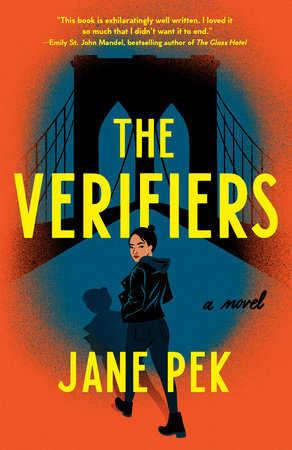There are two kinds of detective stories.
In one, the detective is a constant. They march through the mystery at hand, gathering information, forming hypotheses, arriving at conclusions. These detectives are cleanly drawn, with distinctive habits and mannerisms and turns of phrases and sartorial choices, with lines that do not change. They serve the purpose of solving the crime; who they are beyond that doesn’t really matter.
In the second kind of detective story, the detective matters as much as the mystery itself. Arguably more: the mystery matters because it matters to the detective. Part of the delight in reading these stories is getting to know the detective, understanding why solving the mystery is vital to them, and appreciating how they change and grow throughout the narrative.
I grew up reading detective stories of the former category, but when I realized that my debut novel The Verifiers was going to be a murder mystery—albeit one examining the implications of Big Tech, data collection, algorithms and AI for how we make romantic (and other) choices—I knew I wanted my detective to belong to the latter. The sleuth I created, Claudia Lin, is a 25-year-old second-generation Chinese American who rebels against model-minority expectations and hasn’t told her mother she prefers girls (with the result that her mother is perpetually on her case to find a nice Chinese boy). She lucks into a job at a boutique agency called Veracity that helps its clients investigate the truthfulness of potential romantic partners they meet on dating platforms; when a client with an unusual request goes missing, Claudia decides to investigate that as well, and ends up uncovering a maelstrom of intrigue and deceit. Along the way she navigates her complicated family dynamics, finds a fulfilment in the work that she does, and even, maybe, starts to consider the possibility of dating herself.
Below are seven novels I read over the course of writing The Verifiers that feature wildly different detectives—a Cold War spy, an Scottish journalist in the 1980s, and a multiverse traveller, to name a few—all of whom have deeply compelling voices and personal stories. Plus, most of them are series, and so if you enjoy these books, there is more to be had.
Who is Vera Kelly? by Rosalie Knecht
Set in Buenos Aires during the Argentine Revolution of 1966, Who is Vera Kelly? follows the eponymous CIA spy—and closeted lesbian—as she wiretaps politicians, infiltrates a Marxist student group, and, once the coup takes place and she finds herself stranded, plans her escape. At the same time, this is as much a coming-of-age story as a spy thriller. The present-day chapters are interspersed with Vera’s backstory: her fraught relationship with her mother, her love for her high school best friend, her prior life in New York City.
There is so much I love about this novel. The quiet, assured elegance of the writing, the descriptions of Buenos Aires and New York City, the subversion of the Cold War spy story; and Vera herself, intelligent, wry and resourceful, at once masterfully self-sufficient and achingly lonely. At the end of it all, the most important mystery is the one suggested by the title, which the reader unravels along with Vera herself as she tries to find her way home.
Land of Shadows by Rachel Howzell Hall
Detective Elouise “Lou” Norton is a Black LAPD homicide detective whose sister went missing as a teenager. When, years later, the body of another teenage girl is found in the same neighborhood, Lou becomes convinced that the two crimes are linked and that by solving this murder, she can finally learn what happened to her sister. Lou’s voice pulls you along from the very first page: she’s smart and snarky and driven, her observations spot-on and frequently hilarious, someone whose toughness makes her vulnerability even more poignant. Plus, I love how fully Lou’s life is portrayed—she may be focused on solving a crime, but she also has a circle of close friends, a philandering husband to worry about, and colleagues who respect and also challenge her.
The Likeness by Tana French
All of Tana French’s novels are wonderful psychological studies of her detectives, but The Likeness is my personal favorite. Ex-Dublin Murder Squad detective Cassie Maddox is persuaded to impersonate a murder victim, Lexi Madison, to whom she bears an uncanny resemblance (and who in fact was living under one of Cassie’s aliases from an earlier undercover assignment). She moves into the house where the victim lived with her four housemates, who are now suspects in the murder, and gradually the boundaries between her life as Cassie Maddox and as Lexi Madison begin to blur. The premise is completely outrageous but French pulls it off, in my opinion, because of how compelling Cassie is as a character: she is in deep, and we as the reader are right there with her.
Field of Blood by Denise Mina
Paddy Meehan is a teenage copygirl at the Scottish Daily News in Glasgow circa 1981 who desperately wants to be a journalist and to have a bigger life than what her tight-knit working-class Roman Catholic community expects of her, which is to get married and start raising children. When the newspaper publishes an article about one of the suspects in the brutal murder of a toddler, who is her fiancé’s young cousin, Paddy’s family and community shun her, believing that she betrayed them to advance her career. This impels Paddy to start investigating herself, and she becomes increasingly convinced that the police are on the wrong track.
Field of Blood is the only book on this list to be written in the third person, which creates a bit more distance between the reader and Paddy as the primary narrator (and allows for other occasional viewpoints), but Paddy emerges, in all her insecurities and recklessness and longing for things she is aware she’s not supposed to want, as a most vivid character.
The Tea Master and the Detective by Aliette de Bodard
Sherlock Holmes as a female scholar (abrasive still, because it wouldn’t be Holmes otherwise) and John Watson as an ex-military transport mindship with PTSD called The Shadow’s Child, reluctantly teaming up to solve a murder in a Confucian galactic empire inspired by Vietnamese culture: need I say more. This novella is an inspired recasting of the Holmes-and-Watson pair, but one centred by The Shadow’s Child’s efforts to come to terms with its past and finally move beyond it.
Follow Her Home by Steph Cha
As a writer who gets pretty attached to her characters, I have to admire how Steph Cha destroys her amateur-detective protagonist’s life over the course of a few days. Juniper Song, self-described “half-employed twentysomething”, has been adrift since tragedy befell her younger sister while Song was away at college, for which Song holds herself to some extent responsible. Now she lives in Los Angeles, where she grew up, reads Raymond Chandler novels (she’s obsessed with Philip Marlowe), and hangs out with Diego and Luke, her two best friends from college. Then Luke asks her to investigate whether his father is having an affair, as Luke suspects, and Song’s life turns into its own noir novel—a fact she notes more than once—complete with dead bodies in car trunks, threats from menacing strangers, femme fatales, and once again losing those closest to her.
Song is a second-generation Korean American, and the passages describing her upbringing and her family—as well as what it’s like to move through America as a young Asian woman—are among the most affecting in the novel.
The Space Between Worlds by Micaiah Johnson
I had to find a way to shoehorn this book in, which was one of my favorite reads of 2021. In The Space Between Worlds, humans have cracked multiverse travel, but you can only visit a world if the version of you on that world is no longer alive. This means that the poorer and/or less privileged you are, the more valued you are as a traverser, someone who moves between worlds to collect data—and that makes Cara, who is only alive in nine of 381 identified worlds, the perfect traverser.
There’s a bona fide murder mystery: one of Cara’s eight remaining doppelgängers dies under mysterious circumstances, and Cara has to figure out what happened (which, needless to say, blows up into something far bigger than she ever imagined). But Cara herself is just as much of a mystery, because the Cara who is our narrator is in fact an imposter—she’s Cara from another world, who took the place of this world’s Cara when the latter died during her first traversing assignment. The ways that Micaiah Johnson deploys that setup to inform and surprise the reader—and Cara, as she learns the truth about her own past and her relationships on this world—are deeply satisfying.

